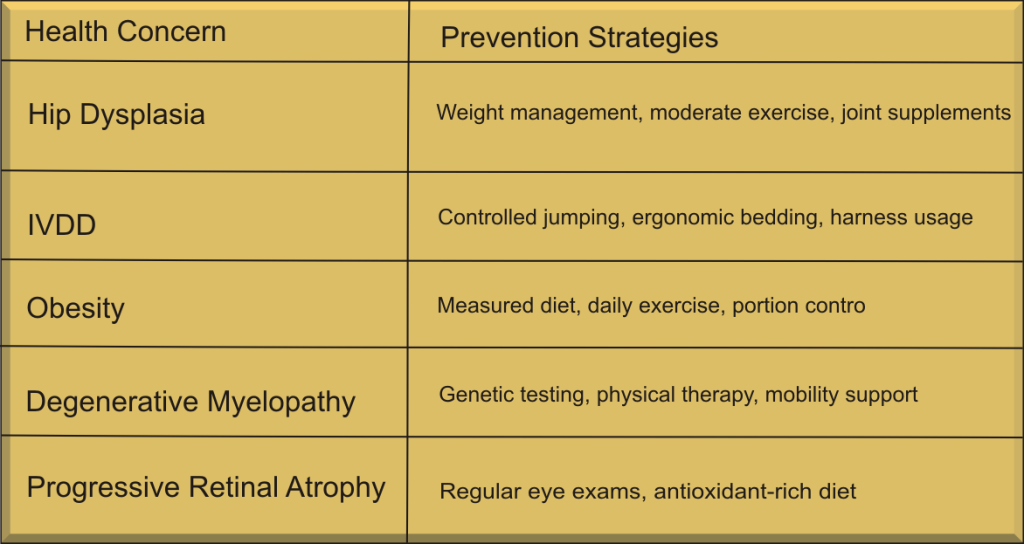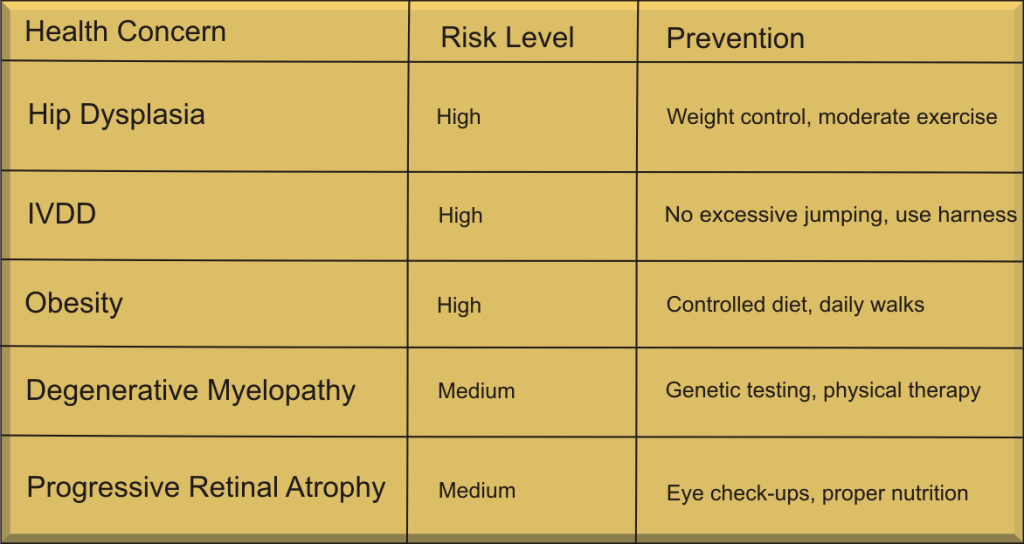Corgi Health Issues
Prevention and Care Guide
Corgi health issues. The beloved Corgi, with its distinctive fox-like face and playful personality, brings immeasurable joy and companionship to countless households. These energetic, intelligent, and affectionate dogs don’t just serve as pets – they become cherished family members who enrich our lives in profound ways. The bond between humans and their Corgis can be extraordinarily deep, creating a mutual relationship of love, trust, and emotional support that benefits both species.

Like all breeds, however, Corgis are prone to specific health issues that require thoughtful attention and care. Understanding and addressing these conditions isn’t just about maintaining your dog’s health – it’s an expression of love and responsibility that reflects our fundamental duty as pet guardians. When we care for our animals with empathy and dedication, we not only ensure their well-being but also nurture our own capacity for compassion and emotional intelligence.
Research has consistently shown that the act of caring for pets, including being attentive to their health needs, can reduce human stress levels, lower blood pressure, and improve mental health. The emotional investment we make in understanding and preventing our Corgi’s health issues creates a deeper connection with our four-legged companions, leading to a more fulfilling relationship that enriches both human and canine lives.
This guide will walk you through common Corgi health concerns and provide detailed strategies for addressing them. By taking a proactive approach to your Corgi’s health care, you’re not just protecting their physical well-being – you’re strengthening the extraordinary bond between human and animal that has been a source of joy and healing throughout human history. Remember, the time and effort invested in understanding and maintaining your Corgi’s health is a profound expression of love that rewards both caregiver and companion in countless ways.
Common Corgi Health Issues
Corgis are generally healthy dogs, but they are predisposed to certain conditions due to their unique build and genetics. Their long bodies and short legs, while endearing, can contribute to musculoskeletal issues. Additionally, genetic factors can increase the risk of certain hereditary conditions. Below is an overview of the most common Corgi health problems, their symptoms, and how they can be managed effectively.
1. Hip Dysplasia
Hip dysplasia is a genetic condition where the hip joint does not fit properly into the hip socket, leading to arthritis and mobility issues. This condition is common in many dog breeds, but due to their active nature and compact build, Corgis are particularly susceptible. If left untreated, hip dysplasia can significantly affect a dog’s quality of life.
- Symptoms: Lameness, difficulty standing up, reluctance to run or jump.
- Prevention & Care Tips: Maintain a healthy weight, provide joint supplements, and ensure moderate exercise.
2. Intervertebral Disc Disease (IVDD)
Intervertebral Disc Disease (IVDD) is a spinal condition caused by the degeneration or herniation of spinal discs. This issue is especially prevalent in long-backed breeds like Corgis. IVDD can cause pain, mobility issues, or even paralysis if left untreated. Managing this condition requires careful monitoring and preventive care.
- Symptoms: Difficulty walking, dragging hind legs, sudden pain or paralysis.
- Prevention & Care Tips: Avoid excessive jumping, provide orthopedic bedding, and use a harness instead of a collar.
3. Obesity
Corgis are known for their love of food, which makes them particularly prone to obesity. Excess weight can put unnecessary strain on their joints, leading to exacerbated health issues such as hip dysplasia and IVDD. Preventing obesity in Corgis requires a structured diet and regular exercise to keep them fit and healthy.
- Symptoms: Excessive weight gain, difficulty breathing, lethargy.
- Prevention & Care Tips: Monitor food intake, avoid excessive treats, and maintain daily exercise.
4. Degenerative Myelopathy (DM)
Degenerative Myelopathy (DM) is a progressive disease that affects the spinal cord and leads to paralysis in older dogs. It is a genetic condition that cannot be cured, but early detection can help slow its progression. Owners must be aware of the signs and take proactive measures to improve their dog’s quality of life as the condition advances.
- Symptoms: Weakness in hind legs, loss of coordination, incontinence.
- Prevention & Care Tips: While there is no cure, physical therapy, mobility aids, and a high-quality diet can improve quality of life.
5. Progressive Retinal Atrophy (PRA)
Progressive Retinal Atrophy (PRA) is an inherited eye disease that causes gradual vision loss and eventually leads to blindness. Although this condition is not painful, it can significantly impact a dog’s ability to navigate its surroundings. Regular eye exams can help detect PRA early and provide strategies for managing a visually impaired dog.
- Symptoms: Night blindness, dilated pupils, reluctance to navigate in dim light.
- Prevention & Care Tips: Regular eye check-ups and antioxidant-rich diets can support eye health.
Prevention Strategies
Keeping Your Corgi Healthy
Preventing health issues before they arise is key to ensuring your Corgi lives a long and active life. Proper diet, regular exercise, and routine veterinary check-ups can go a long way in minimizing risks. Below is a table outlining key prevention strategies for Corgi health:

Essential Corgi Care Tips
Ensuring a Corgi’s well-being requires more than just treating health issues as they arise. A proactive approach to diet, exercise, grooming, and routine check-ups can help prevent many common conditions. Below are some essential care tips every Corgi owner should follow to keep their furry friend in peak health.
1. Balanced Nutrition
A well-balanced diet is crucial in preventing obesity and maintaining overall health. Corgis require a protein-rich diet with controlled fat and carbohydrate intake. Essential fatty acids, such as omega-3s, can help keep their joints and coat healthy. Owners should also be cautious about feeding table scraps or excessive treats, as these can contribute to weight gain.
- Feed a high-protein, well-balanced diet with omega-3 fatty acids for joint and coat health.
- Avoid overfeeding and excessive treats to prevent obesity.
3. Regular Exercise
Corgis are naturally active dogs that require daily exercise to stay fit and healthy. However, due to their susceptibility to joint and spinal issues, their activities should be low-impact to prevent injuries.
- Engage in low-impact activities like walking, swimming, and controlled playtime.
- Avoid overexertion, especially in puppies and seniors.
4. Grooming and Hygiene
Proper grooming helps prevent skin infections, matting, and other health issues. Corgis have a thick double coat that sheds year-round, so regular brushing is essential.
- Brush your Corgi’s coat weekly to minimize shedding and skin issues.
- Regularly clean ears, trim nails, and brush teeth to prevent infections and dental disease.
5. Routine Veterinary Check-ups
Routine veterinary visits are crucial for early detection and prevention of health issues. Annual screenings, vaccinations, and genetic testing can help keep your Corgi in optimal health.
- Schedule annual vet visits for vaccinations and screenings.
- Consider genetic testing for hereditary conditions.
Corgi Health Chart
To make it easier to understand Corgi health management, here’s a graphical representation of common issues and their risk levels:

Conclusion
Corgi health issues. Corgi health should be a top priority for any owner. By understanding the common dog health issues that affect this breed and implementing proactive prevention and care tips, you can significantly improve your Corgi’s quality of life. Regular check-ups, proper diet, and appropriate exercise will ensure that your furry companion remains happy and healthy for years to come.
Taking care of a Corgi is a commitment, but with the right knowledge and effort, you can provide them with a fulfilling and healthy life!

